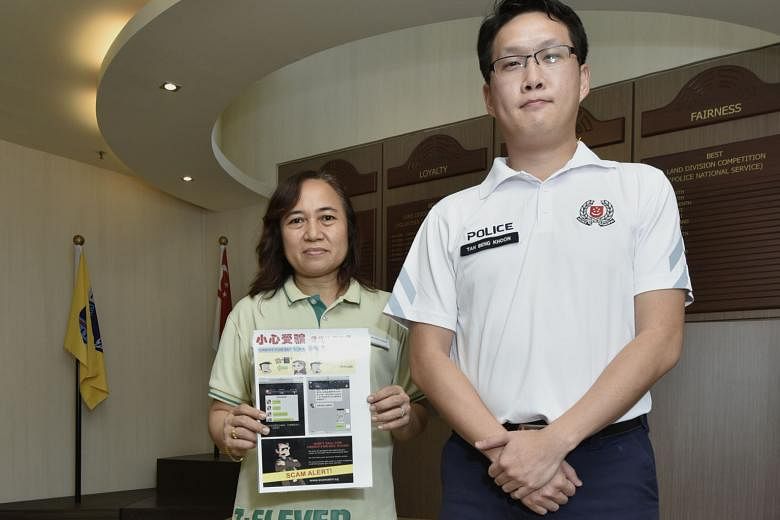The police are working with neighbourhood convenience stores to fight credit-for-sex scams which have robbed men in Singapore of at least $422,000 this year.
The men in blue decided to go on the offensive after a spike in the number of such cheating cases.
The victims are mainly Chinese men aged 20 to 39 who are cheated via apps such as WeChat.
In most cases, the modus operandi is similar: Pretty women approach the men on social media, asking them to buy gift cards and credit for goods online in return for sexual services that are, in the end, not given.
Online commerce offences drove up crime rates last year, with such credit-for-sex scams contributing significantly to this.
-
19-year-old student recalls how he was nearly cheated
-
They met on dating app Tinder, and took their conversation to social media platform WeChat.
Less than an hour later that afternoon, the woman, who claimed to be a 21-year-old accounting student, asked him if he wanted to have sex for two hours - in return for $100.
The 19-year-old student agreed.
But to do so, he had to meet her at a convenience store in Yishun where he lived, and pay for her services by buying an iTunes gift card.
It was too dangerous to pay in cash, he was told over the phone by a man claiming to be the woman's friend.
But, the student said: "I bought the wrong card. They told me if I bought the correct one and gave them the wrong one, they could refund me in cash.
"When I found it troublesome to buy the card and wanted to stop the transaction, the man said he could find out my number, address and school. He told me not to play a fool with them."
He went home to get more cash and, upon returning to the store to get the correct card, saw an advisory warning of the scam.
"That was when I realised I might have been caught up in one."
He said he approached the police only after assurance from 7-Eleven staff that he was receiving empty threats.
He then realised the woman's social media profile was "strange", as it was too generic and not personal.
"The man tried calling me a few more times, but I didn't pick up. I blocked the number and nothing happened after that," he said.
"I haven't told my family. No one knows about this."
Seow Bei Yi
The number of credit-for-sex scams jumped from 66 in 2014 to 1,203 cases last year, with victims cheated out of $2.9 million. One of them lost about $74,000 - the largest amount in a single case.
More than 200 cases were reported between January and April this year, with victims cheated out of at least $422,200.
Officers from Hougang and Yishun North neighbourhood police centres (NPCs) are working with convenience stores to prevent people from being cheated.
In Yishun North, officers work with 7-Eleven staff in an initiative that took at least half a year to perfect, starting from around last July.
Notices warning of such scams are placed in the gift cards section of the store and counter staff show the advisory to customers who buy gift cards in bulk or do so repeatedly.
Victims who buy the cards repeatedly are often told by the scammers that the first amount is to secure services, while later payments are "security deposits" to protect the girl.
Station Inspector Gabriel Lee, 35, from Yishun North NPC, said the police have "only about two to three seconds" to catch victims' attention using the notices and other means, before they lose interest.
He added: "Victims purchase these cards at odd hours. So we needed something that was permanent."
Madam Rosida Arshad, 47, store manager of a 7-Eleven outlet in Yishun, said some customers decided against buying the gift cards after she showed them the advisory.
Victims usually visit the store one to three times in two hours to buy the cards, she said.
Every week, she said, at least one person who bought the gift cards would ask for a refund, with some doing so after pacing around outside the store for a while, looking angry or confused while using their mobile phones. The largest amount for which they have tried to get a refund was around $800 to $1,000, she added.
Since last month, operationally ready national servicemen (NSmen) in the police have been stationed outside convenience stores in Hougang to give advice to distressed victims.
But it is not an easy task, said NSman Samuel Lee, 30, adding: "Victims are embarrassed to reveal, to come forward, to lodge any kind of report for fear of implications on their own families and employers."


